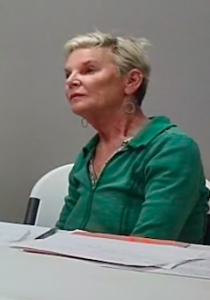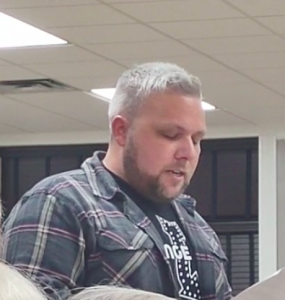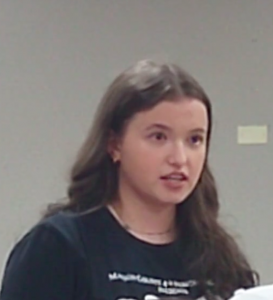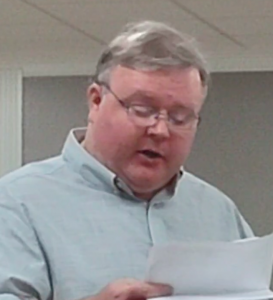 LACIE SILVA – Editor
LACIE SILVA – Editor
Three concerned citizens spoke, on behalf of the Marion County 4-H Performing Arts, at the South Pittsburg city meeting on October 10, to comment on Commissioner Cheryl Kellerman’s remarks from the previous meeting in September.
Wesley Brewer, Sophia Dawson, and Reverend Isaac Blevins have all been involved in the Marion County 4-H Performing Arts for many years past. Their frustrations, hurt, and passion for their work on full display in each of their speeches to the Commissioner. In addition to their experiences with the program, each addressed the comments Commissioner Kellerman shared at the September meeting regarding the program’s usage of the Princess Theatre every year, the impact on profits made by the theatre, and their perception of her comments.
Kellerman’s comments at the September meeting were directed at Ron Milhiser, who spoke at the meeting voicing his own concerns about the art program being unable to perform at the Princess Theatre due to the cost. This issue was brought to the forefront as Milhiser asked the board to find a way for the program to continue performing at the Princess Theatre as it generates substantial revenue for surrounding businesses continuously giving back to the community. Kellerman addressed her comments to Milhiser concerning his past management of the theatre and her own desire for more events to use the space in addition to the program.
When Milhiser, in association with the National Historic Society, managed the Princess Theatre Kellerman noted that the program charged non-profits for the use of the theatre. Milhiser stated that he had charged $150 per day for non-profits, excluding the performing arts group. Discussions between Mayor Samantha Rector, Commissioner Kellerman, and Milhiser continued regarding the time span that the program exclusively held the theatre. Mayor Rector advised that the time frame has always been a three month span of time for practice and performance. Commissioner Kellerman stated her belief that this needed to be reviewed as she did not believe it needed to be unusable except for the performance group. “I’m just saying we need to work together on this.” Commissioner Kellerman stated, acknowledging that the stage pieces were always set up but underscored her opinion that the group did not need to reserve the Princess every weekend for the last month of their performances.
Wesley Brewer, director of the Marion County 4-H Performing Arts program, spoke first about September 12. On that night, Brewer states that he was bombarded with numerous calls and text messages regarding Kellerman’s comments at the city meeting. Brewer summarized Kellerman’s remarks, refuted her allegations, and presented his own statements to support his perspective.
Brewer refuted claims that the program monopolized the theater for three months without a break. He clarified that the total number of days was 48, starting from their initial read-through on January 5 and concluding when they removed their set pieces two days after the final show. During the last two weeks, their presence was limited to after-school hours, with an exception during the load-in week. He emphasized that these schedules had been approved by the board in the prior year and were reaffirmed via email from City Administrator Gene Vess on December 8. Brewer contested the accusation of excessive use of the theater.
Brewer refuted the claim that their play made the theater unusable and pointed to several events that took place during the play’s run. These events included the 150th kick-off celebration, 10 separate Distinguished Young Women of Marion County events and rehearsals, Saturday night programs, the Miss National Cornbread Festival pageant and rehearsals, and the first Market in the Burg, which used the theater’s restrooms. Brewer emphasized that these events, including the pageant and market, occurred less than a month before their opening night and happened over weekends, contradicting the assertion that the theater was unavailable during the play’s final month. Brewer further countered Kellerman’s assertion that they had never dominated the theater for three consecutive months by pointing out that the plays typically occurred from January to April over the past five years, consistently during the same timeframe each year.
Brewer stated, “I’d love to know exactly what programing we prevented Ms. Kellerman from utilizing the Princess for, during this time.”
Brewer confronted his broader concern, that Kellerman seemed to prioritize the potential revenue lost over the income generated by the play and students. He noted that the city provided concessions, resulting in $1,926.89 in revenue for the 2022 play production. Brewer expressed appreciation to the city and other responsible parties for their support over the past five production seasons, stating that they aligned with the vision outlined by the South Pittsburg Historic Preservation Society for the Princess Theatre’s restoration, as described on their website in 2004. This vision emphasized the Princess Theatre’s role as a source of community pride achieved through collaboration among citizens and businesses to reach common goals.
Brewer clarified misconceptions regarding the decision not to hold the 2024 production season at the Princess Theatre. He emphasized that he had not contacted the Gilberts or their company, 22Visionz, for a quote, and no such quote was ever provided. Furthermore, Brewer affirmed that the Gilberts had not prohibited them from performing at the Theatre or made any statements suggesting such restrictions, contrary to rumors in the community.
Brewer explained that his decision was influenced by the management’s direction and the board and commissioners responsible for the Princess Theatre. He personally decided that it would be in their program’s best interest to explore alternative options.
Brewer cited that Mr. Gilbert did contact him via text message in March and May. Brewer stated that he responded to the message and that in the September city meeting, Mr. Gilbert had insinuated that the message was not appropriate to bear repeating aloud in a public forum. However, Brewer stated that he had printed out the screenshots of the text messages and would also read them aloud during the meeting.
Brewer cited, on May 8 at 11:40 a.m. Mr. Gilbert wrote, “Blessings, let me know when we can get together in person. I’m excited to see how we can make some history together.” On May 9 at 11:35 a.m. Brewer stated that he responded, “Thank you for reaching out. At this time due to our extensive history working with the Princess over the past few years we feel it is best that we take an off hands approach and let it run as the city was chosen. We wish you the best and truly hope the Theatre shines as we know it can.”
Brewer stated that multiple residents of South Pittsburg had contacted him voicing their concerns regarding Kellerman’s comments and that numerous people had assured him Kellerman’s opinions did not reflect that of her constituents. Brewer confronted the issue that despite this assurance the board members are elected by the citizens of South Pittsburg and all comments and decisions made by said board members are a direct reflection of the citizens. He finalized his speech by stating, “please keep this in mind as you visit your polls in upcoming elections.”
Commissioner Allison Buchanan raised concerns about the frequency of the Cornbread festival pageant’s use of the Princess Theatre, noting that the calendar indicates 10 to 11 times. Brewer clarified that the theater was planned as a backup location in case of rain, but he wasn’t responsible for writing that information and didn’t know who had. In response, Buchanan requested that Brewer investigate and provide her with the details.
 Sophia Dawson, the senior class president at MCHS and a participant in the 66th annual Distinguished Young Women of Tennessee program, was the second speaker. She shared her experience in the Marion County 4-H Performing Arts program and discussed how Kellerman’s comments had affected her.
Sophia Dawson, the senior class president at MCHS and a participant in the 66th annual Distinguished Young Women of Tennessee program, was the second speaker. She shared her experience in the Marion County 4-H Performing Arts program and discussed how Kellerman’s comments had affected her.
Throughout the rehearsals and performances she found herself in everything she wanted to be, thinking that Kellerman would “describe the program as a nuisance, hurts me beyond words.” The performing arts community has significantly impacted her life, providing support and encouragement to step out of her comfort zone. Just three years ago, she couldn’t have imagined standing in front of a sold-out crowd, and only a year ago, she hadn’t considered becoming a Distinguished Young Woman of Marion County. “This program has helped me to learn how to shine,” Dawson expressed with deep emotion.
Dawson shared her personal experience as a participant in the Distinguished Young Women of Marion County, highlighting that their rehearsals occurred in the same space. During these rehearsals, the set and props from “The Addams Family” production remained undisturbed. Importantly, no issues were raised by participants or judges regarding these set pieces and props, which were designed for easy mobility on and off the stage. “Rather than a nuisance our program was an anchor for your theatre.” Dawson conveyed, further sharing that the program was responsible for gathering the interest of youth from various schools and diverse backgrounds, these young individuals have come together to collectively support one another while creating something truly remarkable.
Dawson displayed her emotions stating, “What a wonderful legacy to be tied to, but you’ve lost that.” Dawson continued by stressing, “My parents taught me actions have consequences, and the general disdain expressed by Commissioner Kellerman’s remarks have not only hurt me but my peers who have and will continue to share this program. The Arts Community will continue to shine with or without your support. I as a student am deeply saddened by your lack of care for the young adults in our community.”
Concluding the responses to Kellerman, the last speaker was Reverend Isaac Blevins, a committed volunteer for Marion County 4H and the Performing Arts, who is also a strong advocate for the arts in the community. Reverend Blevins has played an active role in working on, organizing, and participating in events on the Princess Theatre’s stage to generate funds for various charitable organizations and causes.
As proposed by Brewer and further emphasized by Blevins, the main issue seems to revolve around a misunderstanding of the theatre’s mission. Blevins continued to state that there appears to be confusion between promotion and profit. While Blevins emphasized his comprehension that promotion requires funding, he proposed that profit was never the primary focus of the Princess Theatre’s mission. The theatre was saved, restored, and continues to operate with the central goal of promoting and encouraging local arts and events. However, he believes that the recent direction has shifted more towards profit and away from supporting and promoting the community. This shift, in his view, has led to a disconnect with the essential connections with the community audience.
Blevins asserted, “When you promote yourself over the institution entrusted to you, it’s hard to maintain the appearance of any regard for your patrons.” As Blevins further explained, therefore, there is minimal community engagement, and the misconception of selling out the seats will prove unattainable. “The only sell-outs we have are you.” Blevins stated resolutely.
Moreover, Blevins expressed his desire for the board to regain the trust of local creators who feel neglected. He acknowledged that the arts have a business aspect, but he emphasized the importance of emotions and how many individuals have been negatively affected by the board’s indifferent actions. Blevins addressed that the young people that have been hurt will soon be the voters in the community. He finalized his speech indicating that by telling the young people they have wasted and misused “their time in the theatre, in a program that they love and that has loved them in return, don’t be surprised when they turn around and tell you that you have misused your time here.”
Near the end of the meeting, Kellerman addressed Dawson and the audience, encouraging all to review the September meeting for her full remarks. “At no time did I ever -and that’s what has been swirling around now for a month- was ever against High School musicals.” Kellerman addressed the rumors and statements by townspeople refuting that she had spoken negatively about the program. “It’s a very valuable resource,” Kellerman responded to Dawson. Dawson stated she had watched the meeting and that she was there to defend the program. “What you have to put aside is, my duties as a commissioner for the city is to try- the city now pays for all of it since the historical society isn’t doing it anymore. We keep changing things around. We have to have a way to pay the bills.”
The passionate speeches effectively underscored the positive impact of the program and expressed valid concerns about the direction of the theater’s mission and its potential impact on community support. These speakers exhibited a deep emotional investment in the program, highlighting their dedication and commitment. However, it’s essential to acknowledge that their perspectives may not entirely align with the full context of Kellerman’s remarks.
The Marion Tribune – October 19, 2023










